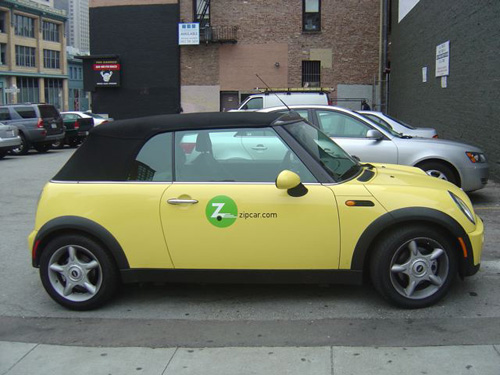Today on the Network, a celebration of the growth of car-sharing, some thoughts on overcoming crazy anti-transit rhetoric and an innovative strategy for encouraging bike commuting.

Photo: Davis Voice Zipcar has gone public, sending a powerful signal that the car-sharing service is here to stay.

The Perfect Simplicity of Zipcar: In honor of its initial public offering, Rob Pitingolo at Network blog Extraordinary Observations pays tribute to Zipcar. The growing car-sharing service is not a substitute for transit, he says. In fact, without a variety of transportation options, the Zipcar model just doesn’t work very well. Zipcars tend to live near transit stations. That’s why, Pitingolo says, you don’t see the service expanding in cities like Dallas and Houston. “Zipcar isn’t just a business, it’s a tool of urbanism. It provides neighborhoods a tremendous social good. And the fact that it’s provided by a for-profit company on the verge of profitability is definitely something to note.”
The Bogus “Social Experiment” Argument: Here’s the type of thing you might say if you oppose a transit investment: blah, blah, blah SOCIAL EXPERIMENT! This was the position, in a nutshell, of a recent editorial in the Seattle Times, regarding the controversy over the Alaskan Viaduct tear down and the construction of a deep-bore tunnel for vehicle traffic. “It’s about a social experiment: The idea is to force gridlock so more people take public transit or ride bicycles,” said columnist Jordan Royer. But as Frank at Network blog Orphan Road points out, that grossly hyperbolic position makes approximately zero sense. “In truth, all transportation is social engineering. If we build more highways, we’ll be manipulating society as well, just in the way that they prefer.” That’s a social experiment that we’ve tried and it’s not working very well. What kind of society will we become if we don’t try to improve on our system, with all its flaws and inefficiencies?
相關報導 http://www.bnext.com.tw/article/view/cid/140/id/17132
撰文者:戴佳慧 發表日期:2011-01-28足跡遍佈全美兩百多所大學的Zipcar共乘系統,今天宣布旗下將加入八台Toyota插電式混合車Prius PHV,一方面協助Toyota測試評估最新混合式動力科技,另一方面研究電動化汽車在共乘模式當中的效能。Toyota預計於2012年才會開放PHV上市,因此Zipcar是這款最新環保汽車的首批使用者之一。採用鋰電池Toyota的Prius PHV可用110伏特的牆上插座充電,充電時間三小時。Prius PHV在電力模式下,能以100 km/h的速度行進21公里,之後切換到混合汽油模式,可達50 mpg (相當於每公升21公里)的燃料效率,非常適合Zipcar短程共乘的使用模式。Zipcar共乘系統美國、加拿大、英國都有據點。Zipcar採用會員制,租借以小時計費。Zipcar旗下車輛停靠在市中心和大學校園的固定位置,會 員只要上網預約,就能夠以會員卡感應開啟車門,使用車內的鑰匙將汽車開走。Zipcar輕簡的使用模式在美國大受歡迎,2000年成立後很快席捲美國各大 校園。
Zipcar對於電動化汽車的推廣不遺餘力,早在2002年就將Toyota RAV4 EV引進Boston,目前車隊裡15%到20%都是電動化汽車。
關於zipcar
http://en.wikipedia.org/wiki/Zipcar
http://www.facebook.com/zipcar

